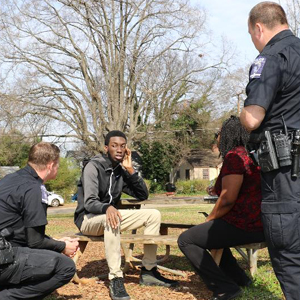BACKGROUND
The Charlotte-Mecklenburg Police Department’s (CMPD) Voluntary Registry for Vulnerable Populations “Safe Outcomes” Program enables the CMPD to obtain critical information (prior to an actual emergency) that assists in response to calls for service involving an individual with Alzheimer’s disease, blindness, autism, Down’s syndrome, deafness, attention deficit/hyperactivity disorder (ADHD) and other developmental disabilities that may affect the way individuals interact and respond to law enforcement officers.
Benefits include providing peace of mind to caregivers, promotes officer safety, can reduce CMPD and officer liability, and help to de-escalate calls for service involving individuals with medical and/or developmental disabilities.
Officers having information about the nuanced behavior of an individual with Alzheimer’s disease, or a child with ADHD, prior to responding to their home, is better prepared to bring the call to a peaceful resolution without necessitating taking action in response to resistance. In the case of children with autism, for example, lights and sirens can be a particularly stimulating trigger for aggressive behavior. Officers can approach the call in a more sensitive manner and may be able to better resolve the situation.
 HOW DOES IT WORK
HOW DOES IT WORK
Information entered by residents into the Safe Outcomes application will be added to CMPD’s computer aided dispatch (CAD) special situations remarks and will be included with any other flags for the specific address provided by the resident. When 911 Communications receives a call for service and the address is associated with an address registered in Safe Outcomes, and the call is dispatched to the Officer, the CAD screens for officers and dispatchers will indicate this is Safe Outcomes “Flagged Address.”
The information on this screen alerts the Officer that at this call for service address resides a person who is registered with the Safe Outcomes program. The responding Officer can open the link displayed on their CAD screen and read summary information and photo (if one is included) about the person registered in Safe Outcomes.
Safe Outcomes is voluntary for those participating and all information is kept confidential. There is no enrollment fee.
ENROLLMENT IS EASY
Caregivers can enroll family members, friends, or clients with medical and/developmental disabilities on the
Safe Outcomes portal website: https://safeoutcomes.charlottenc.gov/ Once a registered user, a caregiver can register up to four persons on the Safe Outcomes portal including names and contact information of family, friends, neighbors who interact with individual, and a current photo of the individual. To mitigate confidentiality issues, CMPD has included a waiver in the registry. Providing data is voluntary and the information will be used solely for the purpose of assisting Officers and other first responders in providing service.
There is no enrollment fee.
REGISTRY INFORMATION COLLECTED

The registry information compiled is paramount to the success of Safe Outcomes. Information gathered should provide officers the tools necessary to be able to communicate with registered persons and to provide the appropriate assistance.
A sampling of types of questions the CMPD has included on its electronic “Safe Outcomes” voluntary registry questionnaire includes:
- Safe Outcomes Person Information
- Address
- Physical Description
- Diagnosis/Disability
- Special Considerations
- Method of Communication
- Commonly Worn Items
- Approach Suggestions
- Primary Contact Information
- Secondary Contact Information
- Current Photo
- Vehicle Information (If Drives)
Caregivers are encouraged to sign back in as frequently and as necessary to update information about your registration(s).
PARTNERSHIPS
Key to the success of the Safe Outcomes program are the strong partnerships formed with non-governmental organizations, government agencies, and private businesses. These partnerships can act as force multipliers, expert advisors, and resource providers. They also can provide assistance with outreach by identifying ways to access target groups and to advertise the availability of the Safe Outcomes program. More importantly, these groups provide program legitimacy that is often necessary when encouraging caretakers to register their loved one.